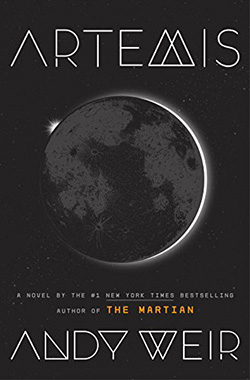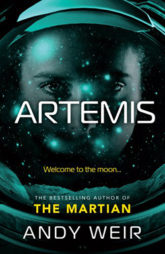It’s been six years since Andy Weir became a self-publishing success story on the back of The Martian. A scientifically fastidious yet satisfying work of fiction that spoke of a stranded astronaut’s struggle to survive on the ruthless red planet, it—and Ridley Scott’s subsequent adaptation of said—made sci-fi fun for some; specifically for folks who had previously sneered at the genre for its seeming self-seriousness.
Those readers will be over the moon to hear that Artemis is, in its attention to technical detail and its prioritisation of play as the order of the day, The Martian’s perfect partner, though more demanding fans of the form are likely to find it slight: derivative, dreadfully slow to start, and rather lacking in the heart department. But for better or for worse, Weir’s new novel is in many ways more of the same problem-solving stuff that made him a household name.
Buy the Book


Artemis
In theory, at least, one of Artemis’ most dramatic departures from The Martian is in its central character. Mark Watney was a Real America Hero: a white dude who did good. Jazz Bashara, on the other hand, is a young woman of Saudi Arabian descent who makes her living by breaking the law. This transparent flipping of scripts has little impact in practice, alas. While she might be a rule-breaker to begin with, Jazz is every inch the saviour before the book is through, just like her predecessor. And just as Watney was, for all intents and purposes, a man of Mars, Jazz, the hell with her heritage, is “a local gal. Grew up right here on the moon.” The net effect of her gender, meanwhile, is that Weir seems to see it as a license to make altogether too many jokes about breasts and banging.
Needless to note, this is not sophisticated sci-fi. But to paraphrase Jazz, who likens the shining city the novel is named after to “a bunch of metallic boobs,” Weir is clearly no poet—and he knows it. In truth, Artemis, “the first (and so far, only) city on the moon” does bear rather a resemblance. “It’s made of five huge spheres called ‘bubbles.’ They’re half underground, so Artemis looks exactly like old sci-fi books said a moon city should look: a bunch of domes. You just can’t see the parts that are below ground.”
It’s in these nether regions that we find the story’s hero-to-be. Jazz is “one of the little people” who eke out an existence in Artemis by doing the dirty jobs the “rich tourists and eccentric billionaires” that make up most of the city’s population are unwilling to. As she herself has it in her distressingly on-the-nose narration, “you don’t expect J. Worthalot Richbastard III to clean his own toilet, do you?”
Now Jazz isn’t quite a skivvy. She’s a porter who moves luggage and the like from point to point on her trusty steed, Trigger—one of several similarly frustrating subjects introduced early on, only to be ignored for the rest of the text. An honest job doesn’t an honest wage make, unfortunately, so while she awaits her EVA certification, she smuggles some on the side. Just cigars and such, to start. But it’s going to take a whole lot of illicit tobacco to rent a room more spacious than the coffin in “a grungy area fifteen floors underground in Conrad Bubble” that’s all she can afford at the moment, never mind make a dent on the the debts Jazz has—not least to her decent, if disapproving father.
All that could change when one of Jazz’s regular clients, telecoms giant Trond Landvik, asks her to sabotage Sanchez’s harvesters: the machines that mine the moon’s aluminium, creating the oxygen that keeps Artemis’ inhabitants alive as a by-product in the process. A dastardly plan, I dare say—dastardly enough to get Jazz deported if she doesn’t die trying to make it happen. Sensibly enough, she says no initially. “I was a smuggler, not a saboteur. And something smelled off about the whole thing.” But when Trond offers her seven figures to ignore her nose, she agrees immediately.
 Not a little predictably, the answer to all of Jazz’s problems turns out to be the cause of an absolute catastrophe. Property is damaged; a cartel is antagonised; people die, damn it. It’s only when shit has gone so sideways that even gravity’s given up its grip that Jazz finally takes responsibility for her dubious decisions. She assembles a ragtag team to help save the city whose death warrant she just signed and delivers unto them this stirring speech:
Not a little predictably, the answer to all of Jazz’s problems turns out to be the cause of an absolute catastrophe. Property is damaged; a cartel is antagonised; people die, damn it. It’s only when shit has gone so sideways that even gravity’s given up its grip that Jazz finally takes responsibility for her dubious decisions. She assembles a ragtag team to help save the city whose death warrant she just signed and delivers unto them this stirring speech:
“I am an asshole. But Artemis needs an asshole right now and I got drafted. […] This moment—this moment right now—is where we decide what kind of city Artemis is going to be. We can either act now, or let our home degenerate into syndicate rule for generations. This isn’t some theoretical scenario. They burned down a business. They murdered two people. There’s a huge amount of money in play—they’re not going to stop.”
There are parts of Artemis—such as the set-piece this call to arms segues into—that recall the best and smartest chapters of The Martian, but these are few and far between, I’m afraid, and gathered oddly towards the end of the novel. First, the author has to create a couple of problems for Jazz to solve, but his focus in in the first half of the narrative is far too narrow. Rather than devoting some of this downtime to the worldbuilding that helped made his debut so memorable, Weir seems to shrug here. The titular city is familiar to begin with, and although it’s nipped here and tucked there, it inherits more of an identity from similar settings in superior stories than it ever earns in its own right.
The setting, then, is hardly inspired. The characters, such as they are, are pleasant enough, but not very memorable. Like Mark Watney before her, Jazz faces “constant danger, poverty, anger, and worst of all, sheer, unmitigated fatigue” with a wink, a nod, and every now and then a descent into despair so roundly remedied that even these scenes start to feel cheap. Artemis’ narrative is also nonsense: a weightless caper that relies on coincidence and contrivance.
This isn’t a bad book by any means. But it isn’t, in my view, a good book either. It’s fun for a few hundred pages and almost tolerable in between times. Readers who utterly loved The Martian might quite like it, though folks who found Artemis’ leaps-and-bounds-better predecessor to be less than perfect will have a harder time forgiving its various failings.
Artemis is published by Crown in the US and Del Rey in the UK.
Niall Alexander is an extra-curricular English teacher who reads and writes about all things weird and wonderful for The Speculative Scotsman, Strange Horizons, and Tor.com. He lives with about a bazillion books, his better half and a certain sleekit wee beastie in the central belt of bonnie Scotland.










